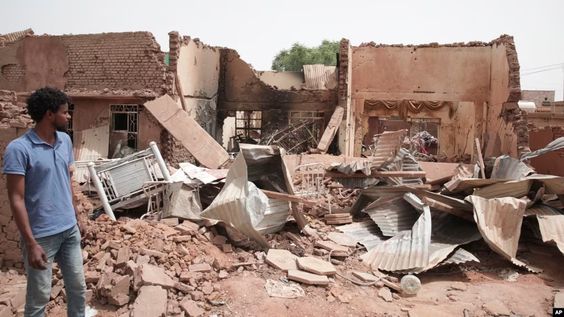Africa
Generals in Sudan are urged by the UN chief to stop fighting right away

Antonio Guterres, secretary-general of the United Nations, pleaded for the fighting between rival generals in Sudan to “stop immediately” and issued a warning that it must not escalate into a protracted, all-out conflict.
He said at a Security Council meeting that was held in the evening to examine the violence, “This conflict will not and must not be resolved on the battlefield — with the bodies of Sudan’s people.”
The U.S.-mediated 72-hour cease-fire began at midnight on Monday, and he emphasized that both sides must abide by it.
Both the paramilitary Rapid Support Forces under General Mohamed Hamdan Daglo and the Sudanese Armed Forces under General Abdel Fattah Burhan openly vowed to respect the cease-fire.
Volker Perthes, the top U.N. diplomat in Sudan, briefed the council via video from Port Sudan, where he and hundreds of other U.N. employees have relocated from Khartoum, explaining that the temporary cease-fire was only holding in some areas of the nation and that the army and RSF were each accusing the other of breaking the truce.
He informed the council, “But we also keep hearing tales of combat and military movement.
“In Khartoum, fighting has largely continued or, in some cases, intensified around the Republican Palace, Khartoum International Airport, the army headquarters, RSF bases, and other strategic locations,” Perthes added. “Heavy shelling and airstrikes have also continued, especially in Bahri and Omdurman.”
Tribes are organizing.
With more than 2.3 million population, Omdurman, which is located north of the capital, is the biggest city in Sudan.
Fighting in the south and west, according to the U.N. representative, has made the situation in Darfur “remain volatile.” He voiced concern over allegations that tribes in West Darfur are arming themselves in preparation for combat.
Perthes said that reports of some tribes and armed groups in Darfur mobilizing and choosing sides were worrisome and might involve neighboring nations.
He claimed that at least 427 people have died and up to 4,000 have been wounded since combat broke out on April 15; the figures are rising. Along with an Egyptian diplomat, there are five relief workers among the deceased. Perthes urged the parties to permit civilians to leave combat zones in safety.
The opposing generals have been in regular contact with the U.N. envoy.
According to Perthes, “there is still no clear indication that either side is prepared to seriously negotiate, suggesting that both sides believe securing a military victory over the other is feasible.” “This is an error in judgment.”
Evacuations
Despite the United Nations’ insistence that it is staying in Sudan, some 1,200 people have been temporarily moved from Khartoum to Port Sudan. According to Perthes, this number includes 744 U.N. employees and their dependents, as well as employees of foreign NGOs and embassy staff.
Perthes added, “Today, this afternoon, I bade 450 of them farewell when they boarded a French frigate that will carry them to Jeddah over the night. “Over the next two days, the remainder will be evacuated using commercial vessels. A small number of foreign employees and their dependents remain in Khartoum for unknown reasons.
Sudan’s needs are depressed by conflict.
More than 15 million Sudanese needed aid before war broke out ten days ago.
U.N. deputy humanitarian director Joyce Msuya told council members that the fighting “will not only deepen those needs, but it also threatens to unleash an entirely new wave of humanitarian challenges.” “Aid activities are severely hampered and put in danger by fighting. A disaster is rapidly developing from a humanitarian crisis.
Nations have hurried to remove their citizens and diplomats. In total, more than 4,000 people have left Sudan in foreign-organized evacuations that started on Saturday, traveling by air and water to Jordan, Cyprus, and Saudi Arabia.
There are several nations that use aircraft and convoys to transport foreign nationals out of the country, including Canada, Egypt, France, Germany, Italy, Sweden, Ukraine, and the United States.
The majority of the American federal employees who left Khartoum, the capital of Sudan, arrived in Washington on Monday afternoon.
According to the British Foreign Office, planes leaving from an airfield outside of Khartoum on Tuesday marked the start of an evacuation attempt.
The majority of Chinese citizens had, according to the foreign ministry of China, been successfully evacuated.
Sudanese nationals are on their own
In the midst of power outages and lost internet access, Sudanese citizens are left to fend for themselves.
Some Sudanese have decided to flee in automobiles and buses on the perilous highways. According to the U.N. refugee agency, since fighting began, at least 20,000 Sudanese have crossed into Chad, and it has also recorded 4,000 South Sudanese refugees who have returned from Sudan.
The deputy humanitarian head stated, “We have received reports of tens of thousands of people arriving in the Central African Republic, Chad, Egypt, Ethiopia, and South Sudan,” and emphasized the importance of maintaining open borders.
Reuters, Agence France-Presse, and The Associated Press all contributed information to this article.
